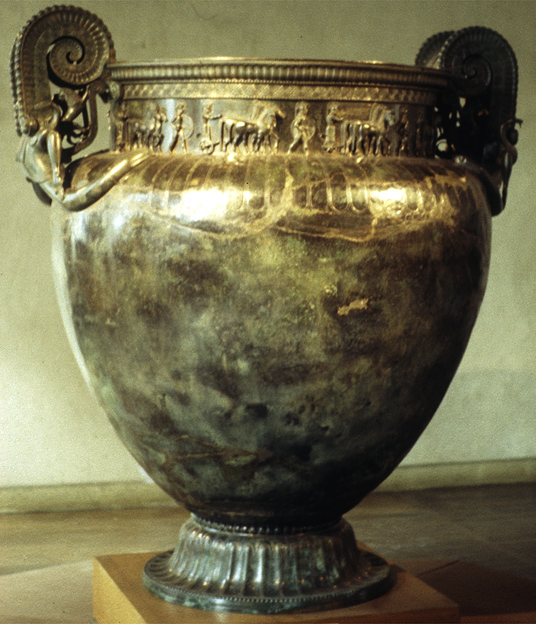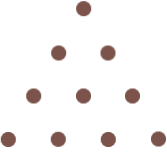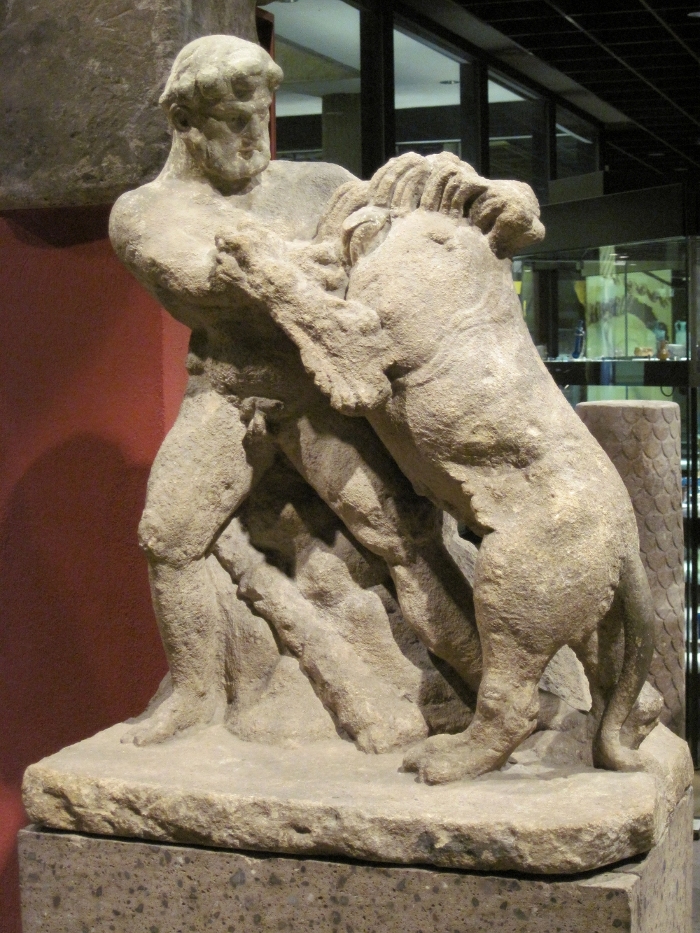PHILOSOPHY IN GAUL
History · The Cosmos · Life on Earth · Recommended Texts
Gaul was a heartland of the druids, who were the first in Gaul to develop an original
philosophy. The Roman Empire inherited all the knowledge and
speculations of the
Greeks, and was able to add some of its own original aspects. Roman Gaul, therefore, was heir to both these traditions.

Like the beautiful Vix crater, philosophy is thought to have been a Greek gift to the peoples of Gaul.
(Musée du Pays Châtillonnais ; photograph by Peter Northover, CC BY-SA 2.5)
History and Orientations
Philosophy in Gaul is thought to have spread into the interior from the Phocæan colony of Marseille (Μασσαλία in Greek, Massalia in Latin). Greek learning about the natural world (including astronomy, geometry and physics) furnished Gaulish scholars with the materials on which to base new theories and conceptions of the universe.Jean-Louis Brunaux (2006), Les Druides : des philosophes chez les barbares. Éditions du Seuil. The conclusions of such scholars—called druides—resembled the philosophy of Pythagoras in several respects. Both schools notably agreed on the immortality of the soul and reincarnation.L. Cornelivs Alexander Polyhistor, cited in Cyril of Alexandria, Contra Iulianum iv. It is probably no coincidence that the druids propagated the doctrine that the Celts of this world were the descendents of Dis Pater, god of the afterlife. Beyond the doctrine that the soul does not die, druids emphasized the study of astronomy, geography, natural science and religion.C. Ivlivs Caesar (recapitulating Posidonius), De Bello Gallico vi:13, vi:18. They also practiced divinization.M. Tvllivs Cicero, De Diuinatione i:90.

The ‘decade’, a Pythagorean representation of the number ten: symbol of the perfection of the universe and of divinity.
It may be that the role of the druids had already greatly diminished before the Roman conquest, after which druidism disappeared entirely, at least as a philosophical school. Other schools, derived more directly from Greek sources, took its place; these were essentially the Platonic school (based on the works of Plato, which would later be reinterpreted by Plotinus and Iamblichus), the Peripatetic school (based upon Aristotle), the Stoics (based on Zeno and Chrysippus, among others), the Epicureans (based on Epicurus) and the Academics (based on Arcesilaüs and tending towards skepticism). The Aristotelian approach is familiar to Christians due to its supremacy in the mediæval scholastic tradition. The materialism of Epicurus and the Academic skepticism are reminiscent for us of modern scientific rationalism. However it is precisely the Platonic and Stoic schools, perhaps the least accessible for us today, that offer most of what is sublime and virtuous in ancient thought. These were, by the way, the most widespread and prestigious schools in the Roman world—including Gaul. Marseille, and later Autun, had schools of philosophy and general culture of considerable prestige. The school of Autun was patronized by many up-and-coming young Gauls, while Marseille was sometimes preferred even to Athens as a destination for Romans wanting to master Greek learning.
Ancient philosophy includes much of what we today would call ‘physics’, ‘chemistry’, ‘optics’, etc. The thoughts of the ancients on these subjects has only a secondary value for us. In my opinion, we would do ill indeed to give up all the advances that recent centuries have brought in the natural sciences. The ancients were, after all, absolutely modern in their time. Plato, for example, incorporates the most recent theories on geometry in his conceptions of the elements and the cosmos. For us, it would be unacceptable to renounce the advances of scientific modernity, notwithstanding that its diversified and skeptical character is very different from ancient philosophy. Let us, therefore, accept the distinction between natural sciences and cosmology, however anachronistic it might be. Concerning other matters, then—our reason for being, the nature of the soul, the good life, virtue, destiny, providence, the gods or the afterlife—what does ancient philosophy have to teach us? As it happens, a great deal.
On the Cosmos
The Sun: a visible god whose action furnishes the analogy with divine providence.
(Photograph by Mila Zinkova, CC BY-SA 3.0)
The Neoplatonist Proclus outlined a very coherent explanation of why we exist.Proclus. Elements of Theology. (His spiritual explanation also accords well with contemporary scientific ideas, bearing comparison to the Big Bang.) Souls, animated beings, material nature, are neither more nor less than the by-products of a providential essence whose beneficent and generative nature is such that it is incapable of not producing. The sun provides us with the prime example of this process. That star is incapable of ceasing to shine, to give off light and heat without end. But it gives them without troubling itself, without wearing itself out, without making an effort. In the same way, the highest gods did not fashion the world in order to torment or test us unfortunate morals. They give and produce because they cannot do otherwise. In the final analysis, they are indifferent to our state; that is to say that their existence transcends our own.
Mortals, on the other hand, have much to gain in orienting themselves towards divinity and thereby readying themselves to receive its benefits. Thus, prayers and sacrifices serve neither to coerce the gods, who cannot be coerced, nor to avoid their anger, which they cannot feel. Piety tends rather to improve the condition of the soul by elevating it towards the gods.Iamblichus, De Mysteriis. How does one receive the gifts of the sun? Certainly not by hiding in a cave or curling up in a heavy coverlet. How, then, to receive the gifts of the gods? Well, one’s soul must get out a bit—out of all the material and mundane things that surround it; one must expose oneself before the radiance of the divinity. In other words, make offerings, pray, meditate, chant hymns, bow before the images of the gods, invoke the divine presence, and so forth.
Quite unlike the Judæo-Christian tradition, Platonic theology teaches that the soul is divine. We are, to so speak, small fragments of the gods on earth. At bottom, this is a positive vision of humankind; however, because of its fragmentation, our divinity is menaced by material distractions. The desires, appetites and misfortunes that affect our bodies can wear the soul down to the extent that it forgets its true vocation. To wit, to pursue the Good, the Beautiful, the True in order one day to rejoin it; and to do this along the paths of the search for knowledge, mystical communion, and contemplation. This type of thought is not without parallel in Hinduism or in the mystical traditions of Christianity, Islam and so forth. In the latter cases, the resemblance is not by chance; Neoplatonism survived among Arab and Byzantine scholars of the Middle Ages, and profoundly influenced the mysticism of the Abrahamic religions.
On Duties within Mortal Life
More concretely, what shall one do with the term that Fortune has given us on earth? This is the principal concern of Stoicism. How to console oneself amidst the woes of daily life, to become one’s own master, to act without fear in the face of injustice—this is precisely the specialty of this philosophical current (which, on the other hand, is by no means without metaphysical vision). According to the Stoics, that person is free who resigns herself to the inevitable. External events are only to be regretted to the extent that they provoke an emotional response within the soul. One cannot control external events, but our emotional response is firmly within our control. To resign oneself with equanimity to fortune and misfortune: this is freedom. Freedom from folly; from fear; from desire. At the same time, such freedom gives us an important opportunity to serve others and the common good. If one has no fear of the consequences of one’s actions—if one is ready to accept the loss of a job, of material comforts, of life itself—nothing stands in the way of courageous opposition to injustice. What would Mahatma Gandhi or Nelson Mandela have been able to achieve if they had been wracked by fear, if they remained attached to transitory goods or positions? Conventional ‘success’ did not interest them; and yet they triumphed. Here precisely is what Stoicism most values. The type specimen of such persevering resistance in the face of almost insurmountable difficulties is Hercules, the especial hero of the Stoics.
Recommended Texts
For non-philosophers, we can recommmend some introductory texts.
- Salustius: On the Gods and the World, a very brief summary of pagan religion marked by the currents of the 3rd century: Neoplatonism, the synthesis of philosophy and traditional religion, theurgy, etc.
- Epictetus: Enchiridion, a sober but practical manual of Stoic philosophy.
- The Golden Verses of Pythagoras (English), (French)
- Cicero: The Nature of the Gods, a dialogue that accessibly contrasts Stoic and Epicurean theologies and Academic skepticism
- Proclus: Elements of Theology, by far the most serious work mentioned so far, which lays out Neoplatonic philosophy in a logic and systematic way
- Musonius Rufus: Fragmenta.Cynthia King has published an English translation of this work under the name Lectures & Sayings (Revised Edition), ISBN 9781456459666. Rufus provides a Stoic perspective that is more progressive and also less pessimistic than Epictetus’.
- Marcus Aurelius: Meditations, a classic work of Stoic inspiration
The ancient texts on druids are of great interest, but unfortunately most of them are so superficial or incomplete that they add little to our general remarks or to a Wikipedia article. They are amply commented on by Stuart Piggott (1985).Stuart Piggott (1985), The Druids. Thames and Hudson. Jean-Louis Brunaux’s synthesis (2006) is brilliant and original.
To explore thoughts of the Platonic family, the dialogues of Plato are naturally the essential point of departure. The most widely read dialogue today is undoubtedly The Republic, but the Timæus and (a very difficult work) the Parmenides are of greater importance from a Neoplatonic point of view. The Phædo et Phædrus are essential as well. The great foundational text of Neoplatonism is the Enneads of Plotinus. A synthesis of Neoplatonism with popular religion, tending towards mysticism, is achieved by Iamblichus whose chief works are On the Mysteries (published under a pseudonym), Collection of the Dogmas of Pythagoras, and On the Soul.
References

En français svp !

Auf deutsch, bitte!


